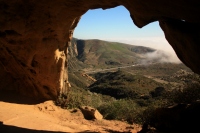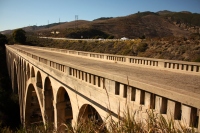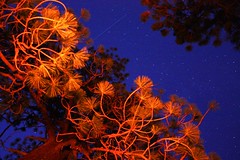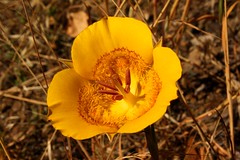 Detail of Nicholas de Fer’s map from 1705 showing Santa Barbara Channel.
Detail of Nicholas de Fer’s map from 1705 showing Santa Barbara Channel.
An excerpt from The Forgotten Peninsula: A Naturalist in Baja California (1961) by Joseph Wood Krutch detailing the suspected origins of the name California:
Most of the place names in Baja or elsewhere in Mexico are self-explanatory. Either they are derived from native words like Oaxaca or Tehuacan; they testify to recent revolutionary enthusiasm like “Libertad”; or they honor the saints and mysteries of the Catholic religion.
In Baja itself some of the favorite saints were honored so often that there are, for example, at least three Santo Domingos and three San Antonios, besides two All Saints (Todos Santos) and such other evidences of overwhelming religiosity as Immaculate Conception (La Purisima Conception), Guardian Angel Island (Angel de la Guarda) and Holy Ghost Island (Espiritu Santo).
The only really shocking exception is “Aunt Jane” (Tijuana). But that border town was not founded until 1830 and it acquired during the reign of Prohibition in the United States a reputation for wickedness which would have made any less secular name highly inappropriate.
The name “California” is quite a different matter. It fits no pattern and offers no evident explanation.
When in 1535 Cortez took formal possession of what he thought was an island he displayed conspicuous lack of originality by calling it Santa Cruz — that being the name of the festival day on which the authority of the Spanish king was formally proclaimed.
Who, then, did literally “put California on the map” and where did he get the singularly euphonious name destined to become familiar to millions of an alien race?
Though its first-known use is in the journal of Juan Paez who wrote under the date July 2, 1542, “We came in sight of California” and though it appears again twelve years later in a published history of Mexico by one Gomara, its first known appearance “on the map” is a chart of 1562 where the name is applied to the tip of the peninsula.
Only by 1600 had it come to refer commonly to the whole of what we now call Baja California.
Three-quarters of a century later the two Jesuit missionaries, Father Juan Baegert and Father Francisco Clavijero, both of whom wrote accounts of Baja after they had been expelled with the other members of their Order from all of Spain, new or old, were speculating over the meaning of the universally accepted name.
Both were familiar with the guess, still current in our own time, that it was derived from “calida fornax” or “furnace,” but they were skeptical.
An even less probable origin suggested was the name of Ceasar’s wife, Calpurnia.
But the hot furnace theory was usually excepted, sometimes with the suggestion that it referred, not to the heat of deserts, but to the enclosed sweat baths which some of the aborigines were accustomed to build.

Barry Lawrence Ruderman Antique Maps — RareMaps.com
Nicholas De Fer’s “Cette Carte De Californie et Du Nouveau Mexique” (1705) showing California as an island.
Continuing without interruption, The Forgotten Peninsula: A Naturalist in Baja California (1961), by Joseph Wood Krutch:
There the matter rested until the American writer Edward Everett (“Man Without A County”) Hale chanced to read a chivalric romance “Amadis de Gaula” which Cervantes calls the “best of all the books of this kind that have ever been written” and which he spares from the flames to which all Don Quixote’s other books of chivalry are to be consigned.
The date, original authorship and ultimate source of this romance is one of the great problems of literary history, but in Cervante’s time it was enormously popular and the fourth book of the romance (apparently an addition) deals with the adventures of a son of Amadis who collects an army drawn from various Christian nations and goes to defend Constantinople against an attack by the king of Persia.
Among the allies of the pagans is a queen of the Amazons who rules an island “at the right hand of the Indies, very close to that part of the terrestrial paradise and inhabited by women without a single man among them.”
These warlike ladies are accompanied on their expedition by an air force composed of five hundred griffins (which are fortunately an important part of the avifauna of their island).
When first released near Jerusalem the griffins wreak havoc because they attack the Turks on the assumption that all men are enemies of the queen. But when this misconception is rectified they prove very effective.
In the end, however, the Christian forces are triumphant, the Amazon queen is converted to Christianity, and is given in marriage to a Christian hero.
What has all this got to due with our subject?
Just this: Edward Everett Hale was startled to notice (and to notice that no one seemed to have noticed before him) that name of the island ruled over by the Amazons was “California,” and the name of the queen herself, Califia.
According to the author of the tale the first of these names was derived from the Greek kalli “beautiful,” and ornis “bird” — because “in this island are many griffins.”
Hale did no more than call attention to his discovery and it probably seemed to him as, at first sight it must, somewhat farfetched.
The assiduous research of scholars (admirably summarized by Ruth Putnam in one of the University of California Publications in History) seems to confirm it so strongly that it is now generally accepted by historians, though my experience is that the man in the street will still say “hot furnace” if asked for an explanation.
The romance was so extremely well known at the time when Baja was discovered that any Spaniard even barely literate would have heard of it and very likely thought of Califia’s island in connection with any described as “near to the Indies.”
Moreover, Amazons had a special fascination for the early explorers (witness the name of the South American river) and now that these warlike ladies were known not to be found in Africa where they had formerly been supposed to live, the imagination eagerly relocated then in several other still sufficiently unknown lands.
Related Post:

































Back to school . . . fascinating
As I sit here in a remote, little known area of Baja, Tres Virgenes, I find it an extremely interesting article. A valuable resource for further reading too by the mentioned writers dating back from the early time of the Jesuits to antiquity. Thanks for writing this post and sharing it. Interesting and informative..